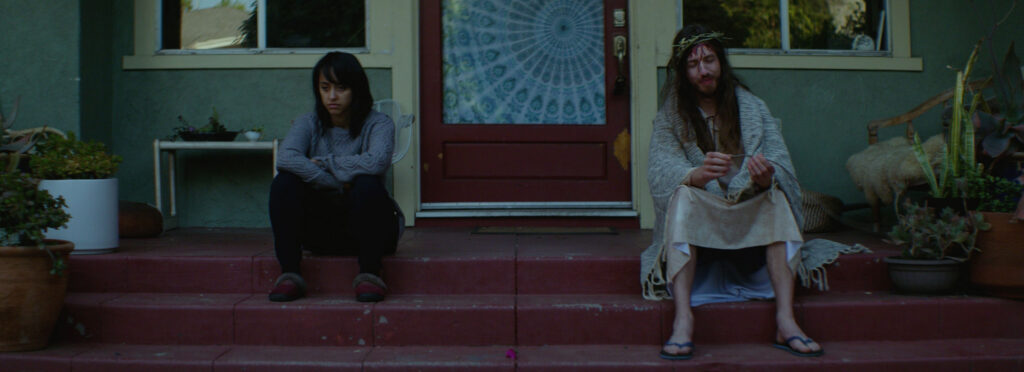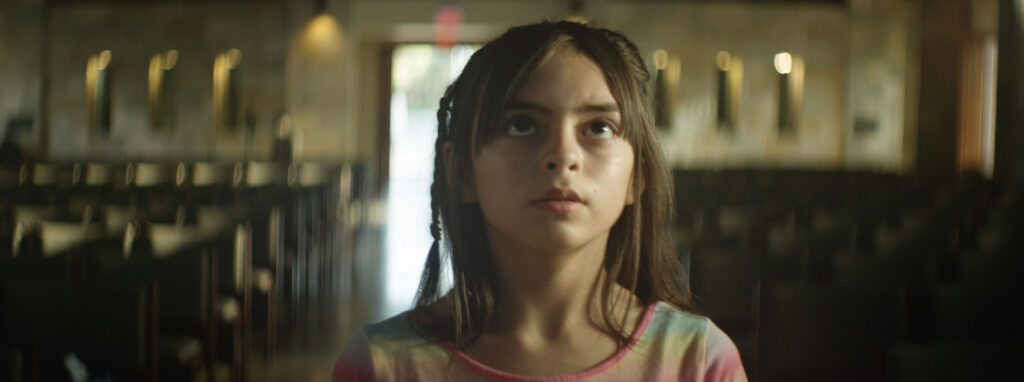Benjamin Ironside Koppin, Courtney Bandeko, David Lee Hess, drama, Ezekiel Koppin, James C. Burns, Jon Ryan McMahon, Joshua Matthew Peters, Krista Morin, Marisol Miranda, Michael Hennessey, movies, Pastor's Kid, Peyton Dilweg, reviews, Samual Charles, San Francisco
March 18, 2024
by Carla Hay

Directed by Benjamin Ironside Koppin
Culture Representation: Taking place in San Francisco and in Sri Lanka, the dramatic film “Pastor’s Kid” features a predominantly white cast of characters (with some Latin people and Indian people) representing the working-class and middle-class.
Culture Clash: A drug-abusing college student has trouble dealing with the anger and resentment she feels toward her pastor mother, who is a born-again Christian and a recovering alcoholic.
Culture Audience: “Pastor’s Kid” will appeal primarily to people who are interested in watching a faith-based movie that is also a well-made psychological drama.

“Pastor’s Kid” is not a typical faith-based drama because it’s not preachy. The movie has a lot of cursing and drug use. It’s also an absorbing psychological portrait of a troubled college student who’s angry at her pastor mother.
Directed by Benjamin Ironside Koppin (who co-wrote the “Pastor’s Kid” screenplay with his wife Kristin Koppin), “Pastor’s Kid” is being advertised as “based on a true story,” although the movie never says the name of the person whose life story is the basis of this movie. That anonymity does not detract from “Pastor’s Kid,” which has a story that can apply to anyone who’s become caught up in drug abuse and has unresolved feelings about their childhood. Much of the movie shows flashbacks to the unhappy childhood of the movie’s protagonist, as a way of explaining how she ended up being so miserable
People who watch “Pastor’s Kid” should not expect a lot of fast-paced action. It’s a “slice of life” movie that takes place in about a month in the life of a San Francisco college student named Riley (played by Courtney Bandeko), who is also a drug dealer on the side. Riley regularly abuses alcohol and cocaine, the drug that she sells.
The movie opens with a flashback to when Riley’s mother Karen Taylor (played by Krista Morin) has become the executive pastor of an unnamed Christian church when Riley was a teenager. Throughout the movie, more flashbacks (which are not shown in chronological order) reveal that Karen is a born-again Christian who spent most of Riley’s childhood as a single parent in the throes of alcoholism. At some point, when Riley was a teenager, Karen got sober and married a Christian man named James (played by James C. Burns), who was very strict with Riley. Predictably, this caused friction in the family.
Riley’s childhood is depicted when Riley was 7 years old (played by Marisol Miranda) and was often left to fend for herself and take care of her younger brother Luke, who is about five years younger than Riley. A flashback shows Karen mentioning that Riley and Luke have different fathers. (Noah Frazier portrays Luke as an adult. Ezekiel Koppin has the role of Luke as a child.)
Riley lives with two housemates, who are also her friends from childhood: Tim (played by Joshua Matthew Peters), who has a messy mane of dreadlocks, is openly gay and very flamboyant. Sarah (played by Peyton Dilweg), another “wild child,” is commitment-phobic when it comes to dating.
For the past year, Sarah has been dating a musician named Lance (played by Samual Charles), but she doesn’t want to describe him her “boyfriend.” Lance is also a college student who plays in a band and has reluctantly gone along with his father’s wishes to major in business, not music. Lance often parties with Riley, Tim and Sarah.
An early scene in “Pastor’s Kid” shows Riley waking up from a stupor at her place. She finds out that Tim rescued her the night before from being kidnapped and potentially raped by two male strangers (played by David Lee Hess and Michael Hennessey), who were trying to put Riley in a car parked outside a bar called Smugglers. Riley has only fragmented memories of what happened, but Tim tells her that a Smugglers bartender named James (whom Riley remembers serving her) has a reputation of drugging women’s drinks.
It’s a sinister scenario that could have ended up a lot worse than it did. Riley tells her mother what happened, and Karen is understandably concerned. She tells Riley that she’s knows what she’s going through and offers to help without trying to scold or shame Riley. Later in the movie, Karen invites Riley on a Christian group trip to Sri Lanka.
“Pastor’s Kid” has a very compelling portrayal of emotional damage and how it affects people’s attitudes and outlooks on life. The movie doesn’t pass judgment on Riley or Karen but instead candidly shows their story from Riley’s perspective, as an example of what can happen when a parent and a child struggle to deal with unresolved issues. Thanks to very good acting from the cast (particularly from Bandeko), realistic dialogue and well-edited filmmaking, “Pastor’s Kid” can maintain viewer interest without being pretentious or melodramatic.
Even though Riley is going through a lot of emotional turmoil, the movie offers some comic relief in hallucinations that she has of a self-effacing man resembling Jesus Christ (played by Jon Ryan McMahon), who freely admits he’s not the real Jesus Christ because the real Jesus (according to the Bible) was not white, and he certainly didn’t wear modern flip-flop shoes. This Christ-like person is not welcomed by Riley. In fact, she’s often irritated by him. Unlike most faith-based movies, “Pastor’s Kid” doesn’t present religion as somehow magically being able to solve problems but instead depicts religion as an optional way to go on a path of healing.
Atlas Distribution Company released “Pastor’s Kid” in select U.S. cinemas on March 15, 2024.
